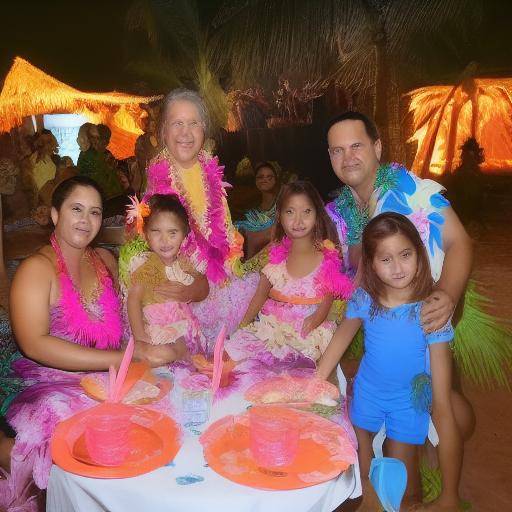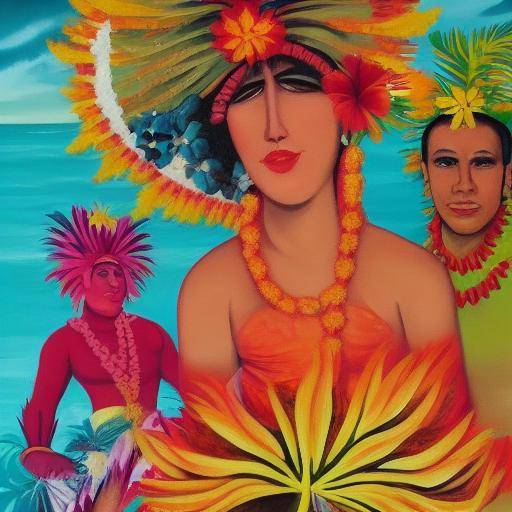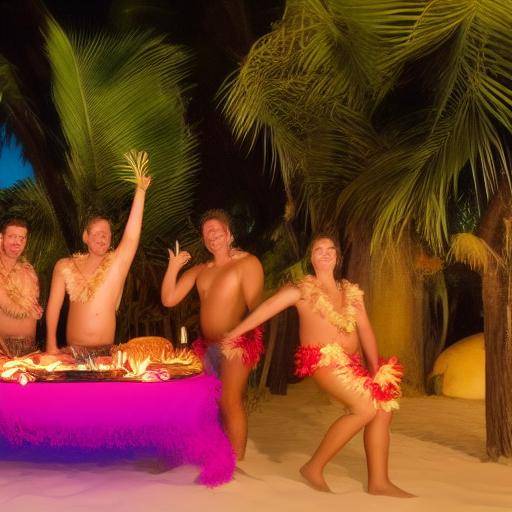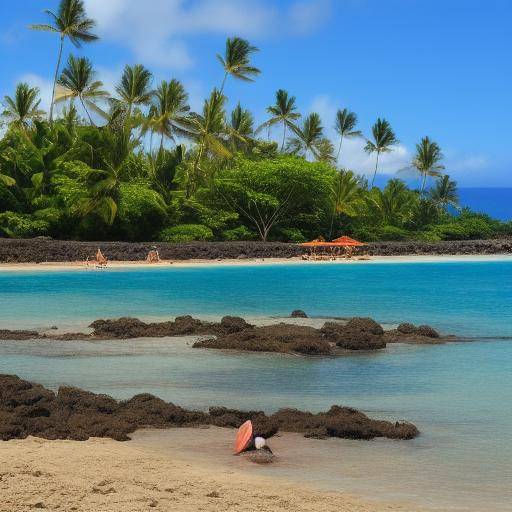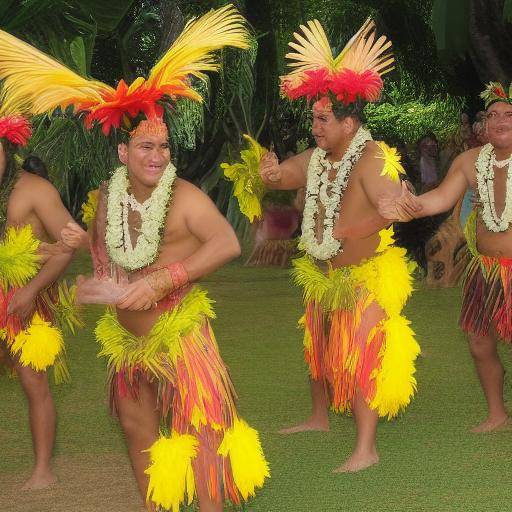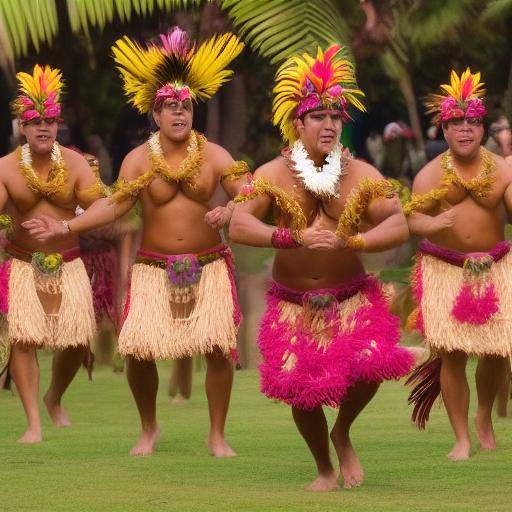
Hawaiian Luau is a traditional celebration that encloses a rich cultural heritage. From folkloric dances to food preparation rituals, this experience expands and enriches the understanding of Hawaiian culture. In this article, we will explore the meaning behind rituals and dances, as well as their impact on traditional education.
Introduction
Hawaiian luau, with its vibrant rituals and dances in the midst of paradisiacal landscapes, is a celebration that has captured the imagination of people around the world. Often associated with parties and entertainment, this event contains deeper meanings that reflect the rich culture and traditions of Hawaii. In this article, we will explore not only the visual beauty of luau, but also the cultural and educational lessons it conveys.
History and Background
Hawaiian Luau has its roots in ancient Polynesian traditions, which arrived in Hawaii centuries ago through migration. In its origin, the luau was a celebration to mark important events, such as births, weddings, or the arrival of distinguished visitors. Over time, the practice evolved to include dances, chants and the preparation of traditional dishes.
Origins and Evolution
The first documented record of a luau in Hawaii dates back to the eighteenth century, during the reign of King Kamehameha II, who abolished the gender taboo at the banquets, allowing women and men to share the meals. This significant action altered the Hawaiian social and cultural structure.
Significado Cultural
Luau is a manifestation of Hawaiian generosity and hospitality. From the presentation of traditional dishes to the performance of dances like the hula, each element reflects the connection with the earth, respect for the ancestors and the celebration of life.
Educational approach
Participation in a luau provides real-time education on Hawaiian culture. Visitors have the opportunity to appreciate the importance of the community, the value of hospitality and respect for nature, all of which is a crucial component of the Hawaiian educational system.
Detailed Analysis
Hawaiian luau is not only a source of entertainment, but also presents a unique opportunity to address relevant cultural and educational issues in today's society.
Benefits and Challenges
Luau offers significant benefits, such as the promotion of cultural diversity, the promotion of intercultural respect and the preservation of traditions. However, it also faces challenges, such as over-marketing that can reverse its authenticity.
Diverse Perspectives
The perception of luau varies according to the social and cultural context. While some see it as an opportunity for cultural expression, others may question their authenticity and respect for tradition.
Current Contours
Today, Luau has experienced adaptations to meet the demands of tourism, which raises questions about the preservation of its cultural authenticity.
Educational methods
Luau is a valuable educational resource that provides a unique sensory and emotional experience. Beyond fun, it provides valuable lessons on history, arts, language and cultural values.
Comprehensive review
Hawaiian Luau and Hawaiian culture have a wealth that transcends geographical boundaries and offers important educational lessons.
Applications and Best Practices
The integration of luau into both formal and informal educational programmes can enrich the understanding of cultural diversity and promote tolerance and mutual respect.
Perspectives of Experts and Industry
Educational and anthropology experts highlight the importance of luau as a powerful tool to teach cultural values and fomentel intercultural understanding. The tourism industry also recognizes its value as an authentic experience that can enrich visitors' travels.
Comparative analysis
Compare Hawaiian luau, Hawaiian culture and traditional education shed light on the interconnections and the mutual influence between these elements.
Similarities and Variances
Luau, Hawaiian culture and traditional education share a deep connection with the history, nature and values of the community. Through dance, music and gastronomy, these cultural expressions convey knowledge and traditions.
Potential synergies
The integration of luau into educational environments can strengthen appreciation for Hawaiian culture and foster a sense of belonging and mutual respect among different ethnic groups.
Practical Tips and Accessible Recommendations
By attending a Hawaiian luau or studying its meaning, it is important to consider certain practical tips that maximize educational and cultural experience.
Tips for Assistants
- Learn about history and cultural meanings behind rituals and dances.
- Show respect for Hawaiian traditions and engage with an open mindset.
Recommendations for Educational Integration
- Incorporate luau-inspired activities to promote intercultural understanding in school curricula.
- Promote respect for cultural diversity through the celebration of cultural festivals that include elements of luau.
Industry Perspectives and Expert Reviews
The importance of Hawaiian luau and its impact on traditional education has been reflected by academics, professionals and community leaders.
Reflections of Experts
"The luau offers a unique opportunity to learn about Hawaiian culture in an authentic context. Taking advantage of this experience can contribute positively to the cultural and educational development of individuals," says Professor Keoni, an anthropologist at the University of Hawaii.
Future Trends and Implications
The growing value of cultural diversity in education and tourism is a crucial role for Hawaiian luau as an educational resource and promoter of intercultural understanding in the future.
Case Studies and Practical Applications
The implementation of Hawaiian luau in educational settings and its influence on traditional education is reflected through specific studies and examples.
Case Study: Maui Primary School
The Maui Primary School, in collaboration with the Hawaiian community, integrated elements of the luau into its curriculum to enrich the educational experience of the students, promoting respect for local culture.
Educational tourism applications
Educational tourism agencies have begun to incorporate luau experiences as part of their programs, recognizing their value to promote cultural understanding and appreciation of diversity in young travelers.
Future Trends and Predictions
Given the constantly evolving educational and cultural landscape, it is important to consider future trends and predictions related to Hawaiian luau and its educational role.
Perspectives to the Future
Luau is expected to continue to be a valuable resource to foster mutual understanding among different cultures, as educational programmes and tourism prioritize the inclusion of authentic cultural elements.
Conclusion
Hawaiian luau, with its rituals and dances, is not only an artistic expression, but a gateway to the rich culture and traditions of Hawaii. In understanding its meaning and educational value, we can appreciate its importance in the preservation and promotion of cultural diversity.
Frequently asked questions
What is the meaning of luau in Hawaiian culture?
Luau symbolizes generosity, hospitality and celebration in Hawaiian culture. It is an occasion to share food, music and dances, and it shows appreciation for life and the community.
What kind of events is a Hawaiian luau held?
Traditionally, the luaus were made to mark important events such as weddings, birthdays, or the visit of distinguished guests. Today, they are celebrated in many tourist events and also on special occasions in the Hawaiian community.
How can Hawaiian luau contribute to traditional education?
Participation in a luau provides a unique educational experience that teaches about history, culture, respect for nature and the importance of hospitality and community.
Do the rituals and dances of luau have any symbolic meaning?
Yes, the rituals and dances of the luau have profound symbolic meanings that reflect the connection with nature, gratitude for food, reverence for the ancestors and the celebration of life.
How has Hawaiian luau been adapted in the tourist context?
Hawaiian luau has experienced adaptations to meet the demands of tourism, which has led to certain concerns about the preservation of its cultural authenticity.
What are some of the best practices to maximize the experience of a Hawaiian luau?
Learning about the history and cultural meanings of luau, showing respect for traditions, and participating with an open mind can enrich the experience of a Hawaiian luau.
We conclude that Hawaiian luau is not only a sample of entertainment, but a window to the rich Hawaiian culture and an invaluable tool for traditional education. In understanding its profound meaning and its educational relevance, we can appreciate its importance in promoting cultural diversity and mutual respect.

